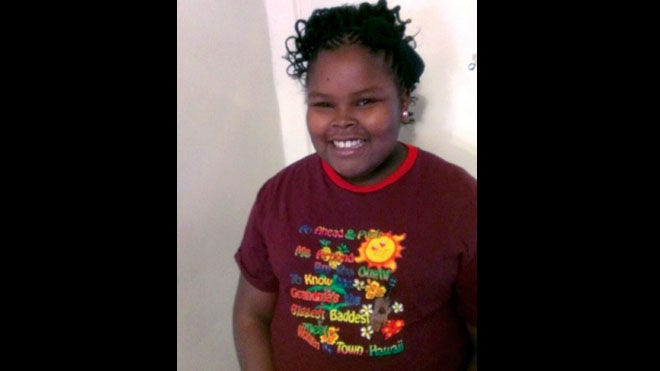
The family of Jahi McMath, the 13-year-old girl declared brain dead after complications from routine tonsil surgery, said Saturday a hospital in New York may be able to accept her and keep her on life support.
The girl’s uncle and lawyer wouldn’t provide the hospital’s name, saying they don’t want media attention to hurt her chance of being accepted and transferred there.
“It’s an organization that believes in life,” attorney Chris Dolan told the Associated Press.
“It’s our last, last hope,” he said after two facilities in California that agreed to accept Jahi decided to back out.
A nursing home in the San Francisco Bay Area that had been willing to care for the girl if she had two tubes inserted changed its mind. Dolan said a facility in the Los Angeles area also withdrew its offer because it didn’t want media attention or to jeopardize its relationship with its doctors, who refused to treat someone who’s been declared brain dead.
Time is short for the family, as Alameda County Superior Court Judge Evelio Grillo on Tuesday ruled that the Children’s Hospital Oakland may remove Jahi from a ventilator at 5 p.m. Monday unless an appeal is filed.
Jahi underwent a tonsillectomy at the hospital on Dec. 9 to treat sleep apnea. After she awoke from the operation, her family said, she started bleeding heavily from her mouth and went into cardiac arrest. Doctors at Children’s Hospital concluded the girl was brain dead on Dec. 12 and wanted to remove her from life support. The family said they believe she is still alive.
Before Jahi can be transferred, she must undergo two more medical procedures — the insertion of a breathing tube and a feeding tube.
“Children’s Hospital Oakland does not believe that performing surgical procedures on the body of a deceased person is an appropriate medical practice,” David Durand, its chief of pediatrics, said in a statement Thursday.
Douglas Straus, a lawyer for the hospital, said in a letter made public Friday that before the hospital would comply with the family’s request to move Jahi, it would need to speak directly with officials at any nursing home to make sure they understand her condition, “including the fact that Jahi is brain dead” — and to discuss needed preparations, including transportation.
“Children’s Hospital will of course continue to do everything legally and ethically permissible to support the family of Jahi McMath. In that regard, Children’s will allow a lawful transfer of Jahi’s body in its current state to another location if the family can arrange such a transfer and Children’s can legally do so,” Straus wrote in the letter.
He also said the Alameda County coroner needed to sign off on the move “since we are dealing with the body of a person who has been declared legally dead.”
Dolan said he had already obtained signed consent from the coroner for Jahi’s transfer. The Alameda County Coroner’s Bureau said it had no comment.
He said Saturday he was waiting to hear from the New York hospital after its facility director and medical director speak.
Hospital spokeswoman Cynthia Chiarappa said the hospital has not heard from any facility to discuss how it can accommodate “a deceased body on a ventilator.”
source: Nbc news


